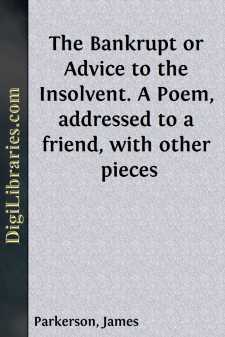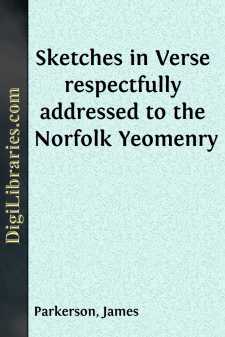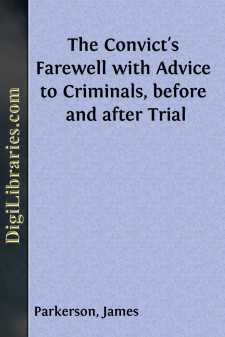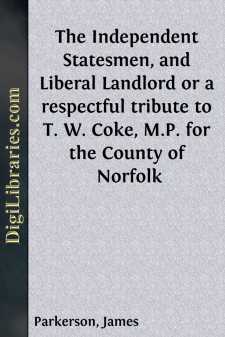Categories
- Antiques & Collectibles 13
- Architecture 36
- Art 48
- Bibles 22
- Biography & Autobiography 813
- Body, Mind & Spirit 142
- Business & Economics 28
- Children's Books 15
- Children's Fiction 12
- Computers 4
- Cooking 94
- Crafts & Hobbies 4
- Drama 346
- Education 46
- Family & Relationships 57
- Fiction 11828
- Games 19
- Gardening 17
- Health & Fitness 34
- History 1377
- House & Home 1
- Humor 147
- Juvenile Fiction 1873
- Juvenile Nonfiction 202
- Language Arts & Disciplines 88
- Law 16
- Literary Collections 686
- Literary Criticism 179
- Mathematics 13
- Medical 41
- Music 40
- Nature 179
- Non-Classifiable 1768
- Performing Arts 7
- Periodicals 1453
- Philosophy 64
- Photography 2
- Poetry 896
- Political Science 203
- Psychology 42
- Reference 154
- Religion 513
- Science 126
- Self-Help 84
- Social Science 81
- Sports & Recreation 34
- Study Aids 3
- Technology & Engineering 59
- Transportation 23
- Travel 463
- True Crime 29
The Bankrupt or Advice to the Insolvent. A Poem, addressed to a friend, with other pieces
by: James Parkerson
Description:
Excerpt
THE BANKRUPT.
Oft have you pray’d me, when in youth,
Never to err from paths of truth;
But youth to vice is much too prone,
And mine by far too much, I own.
Induced to riot, swear, and game,
I thought in vice t’acquire a fame;
But found the pois’ning scenes of riot
Soon robb’d my mind of joy and quiet.
The usual course of rakes I ran,
The dupe of woman and of man.
Careless of fortune’s smile or frown,
My desk I left t’enjoy the town,
At folly dash’d in wisdom’s spite,
Idled by day, revell’d by night:
But short was the delusive scene,
And I awoke to sorrow keen.
Debt press’d on debt: I could not pay,
And found that credit had its day.
No friend to aid, what should I do?
I made bad worse: to liquor flew:
For when my bill-book I survey’d,
I shrunk, as if I’d seen my shade;
And to drive terror from my mind,
Drank on, and care gave to the wind:
But wine nor words can charm away
The banker’s clerk who comes for pay.
Payment is press’d, the cash is gone:
Too late I cry, ‘What must be done?’
Horror! a docket struck appears:
I look aghast, my wife’s in tears.
The naked truth now stares me in the face,
And shows me more than one disgrace.
My keys a messenger demands;
While, as a culprit often stands,
The humbled bankrupt lowers his view,
And sees the law its work pursue.
Soon comes of all his goods the sale,
Which, like light straw before a gale,
The hammer-man puffs clean away,
And cries, ‘They must be sold this day.’
They are so, and I’ll tell you how:
At loss you’ll readily allow.
Then comes the tedious, humbling task,
To answer all commiss’ners ask;
And those who mean to act most fair
Will at first meeting e’er appear,
To questions ask’d will answer true,
And clearly state accounts to view.
A second he need not attend,
But if not may perhaps offend.
Happy the man who then can lay
His hand upon his heart, and say,
‘You all my books and deeds may scan:
I’m honest, though distressed man.
My own just wants, and losses great,
Have brought me to this low estate.’
Then comes the last dread meeting on,
Dreadful to such as will act wrong,
And through dishonesty or shame
Evasive answers ’tempt to frame:
For vain his shifts; howe’er he try,
He can’t elude the searching eye
Of lawyers, who’ll in all things pry:
His private foibles e’en must out—
Grievous exposure ’tis no doubt!
And if he’s fraud’lent found, must go
To witness scenes of vice and woe;
Of liberty deprived, to wail
His faults and folly in a gaol:
But should his conduct seem least fair,
England’s blest laws will set him clear;
Not only so, but means will give
T’enable him again to live:
For such the law, that when ’tis found
There’s fifteen shillings in the pound,
A handsome drawback he’s allow’d,
When, ’stead of shamed, he may look proud;
And be his div’dend e’er so low,
They’ll never let him coinless go.
Yes, be it e’er a Briton’s pride,
That mercy in his courts preside.
But e’er he’s paid, he must await
T’obtain a fair certificate.
Some cases there however are
Which, at first view, may seem severe:
Suppose his creditors are ten;
Four sign, the rest refuse: what then?
If their demand exceed the four
They’ll keep the bankrupt in their pow’r;
And although he has all resign’d,
If unproved debts remain behind,
Inhuman creditors then may
His body into prison lay,
Where oft the wretch, to sooth his grief,
In dissipation seeks relief.
Sometimes a parent may prevent
Unmeaningly the law’s intent;
And merc’less creditors decline
The hapless debtor’s deed to sign,
In hopes the father may one day
The long-neglected son’s debts pay.
...










